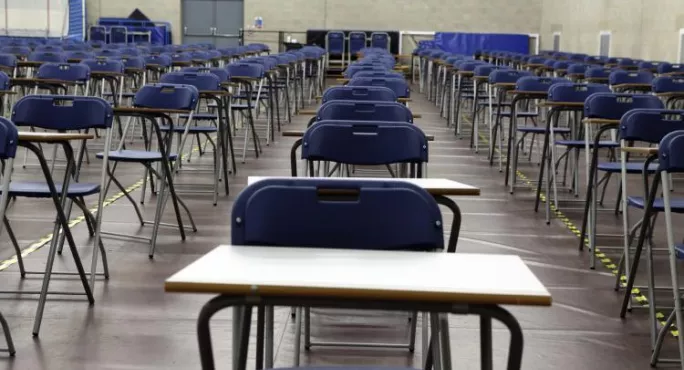- Home
- GCSE resits: 20 colleges will see cohorts of over 500
GCSE resits: 20 colleges will see cohorts of over 500

Around 20 colleges are looking to hold English and maths GCSE exams for cohorts of over 500 students next week, the Association of Colleges has estimated.
According to Eddie Playfair, senior policy manager at the AoC, the volume of entries for next week's exams was “a mixed picture” across the sector. While the overall number might be similar to the November resits in previous years, some colleges were reporting a significant increase in entries, while others were seeing a drop.
“We expect that there will be about 20 that have got over 500 candidates and plenty of other colleges with 300 or 400," he told Tes.
The AoC is calling on the government to make additional funding available to colleges to help them cope with the extra costs this will create – similar to the exam support fund that was available to other centres.
GCSE November resits: The right move at the wrong time?
Association of Colleges: November exams 'pose public health risk'
GCSEs: Why we should hold a second exam series in July
"There will be some very big exams in some colleges. Some colleges will have to move all of their other classes or some of their classes online for that week, colleges will have to employ more invigilators, because if you need more rooms so you can spread people out, you need more invigilators. All of that carries with it organisational problems, and costs as well," said Mr Playfair.
Coronavirus: The challenge of running November GCSE exams
"In terms of how the exams will be run, colleges are following the recent government advice, and that carries costs.”
Mr Playfair said particular pressure points would be students entering and leaving the exam. “That will be a more complex operation. There are options to stagger the start, but there is a limit to what you can do," he explained.
The number of students who might be missing their exams due to either being sick themselves or having to self-isolate over the coming fortnight was also a concern, said Mr Playfair. “I am sure there will be more students who will miss their exams because they have to isolate or because they are ill themselves. We expect a higher level of absence but we don’t have any figures."
Mr Playfair said the cohort contained more learners this year who had a grade 3, and external candidates who did not get a centre-assessed grade this summer, making it likely there was going to be a lower pass rate this autumn.
Exercising their right to sit the exam
City College Norwich has over 800 students planning to resit English and/or maths in November. Principal and chief executive Corrienne Peasgood said that was an increase on last year, "and that is despite the fact we have written and spoken to all our students trying to discourage them from resitting this November".
She said the college had been concerned about the fact that face-to-face teaching had ended in schools in March, and while online learning had continued in college, this was not the same as students learning in their classroom, and therefore students may have missed out on significant learning time in the run-up to next week.
"Nevertheless, in large numbers, they have exercised their right to sit the exam. I think they feel they don’t own their centre-assessed grade and they didn’t get the chance to sit the exam and show what they are capable of, " Ms Peasgood added.
She said while numbers were relatively small on two college sites, allowing for classes to take place as usual, in Norwich, numbers were larger. "In recent years, the college rented an exhibition hall for exam day and transported students there. We have not been able to find a Covid-secure way to get them there. So we will have to cancel some classes on-site and move others online for the day.”
“We will have 450 maths students at Norwich – they won’t be able to all leave at the same time at the end of the exam,” said Ms Peasgood.
“I am not only concerned about students who have to self-isolate now, I am also concerned about bringing large groups of students that would normally not be together in a bubble together for the exam. We will have students from all different areas and some who have now left the college all together. I am very worried about the public health implications of this. We have to balance their right to sit the exam with the risk of spreading the virus.”
In a letter to schools minister Nick Gibb, the AoC's chief executive, David Hughes, said earlier this month that the November GCSE exam series could pose a serious public health risk. He said he would "welcome urgent discussion about whether going ahead with this series of exams is the right thing to do".
A spokesperson for the Department for Education said: “We are committed to working closely with colleges and other providers on the response to the challenges arising from Covid-19, including in respect of public examinations. Colleges run English and maths GCSE exams every autumn: we recognise that this year more students with a grade 4 or above may want to sit those exams and we are providing additional funding to support that. We are also providing up to £96m for small group tuition for disadvantaged students whose learning has been disrupted.”
Keep reading for just £1 per month
You've reached your limit of free articles this month. Subscribe for £1 per month for three months and get:
- Unlimited access to all Tes magazine content
- Exclusive subscriber-only stories
- Award-winning email newsletters



